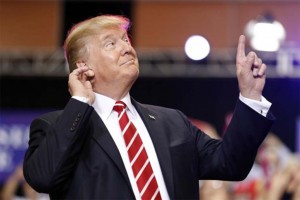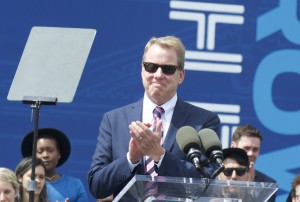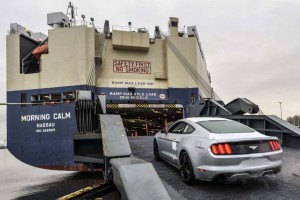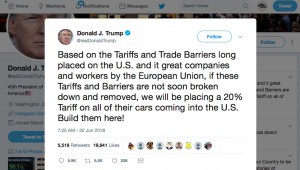
President Donald Trump is threatening to escalate tension between the U.S. and the EU by enacting a 25% tariff on Euro-built vehicles.
Automakers and suppliers are scrambling to respond to a series of moves by the Trump Administration that could negatively impact “nearly every segment of the auto industry,” according to a new analysis by financial rating firm Moody’s Investors Service.
On Monday, Wisconsin-based motorcycle manufacturer Harley-Davidson responded to growing threats of a trade war by announcing plans to move some production from the U.S. to Europe, a shift the company said was forced by the EU’s decision to enact new tariffs countering increases levied by the White House.
That could be just the first step, however. Other manufacturers are studying options, but are waiting to see precisely what President Donald Trump might do next. He has already increased tariffs on imported steel and aluminum, but is considering a 25% tariff on imported cars and car parts.
There is the threat that the North American Free Trade Agreement could be scrapped or radically altered, and news reports from Washington now suggest Chinese investments could be restricted.

Ford Chairman Bill Ford said recently that the uncertainty from the Trump administration makes doing business more difficult.
“A 25 percent tariff on imported vehicles and parts would be negative for nearly every segment of the auto industry — carmakers, parts suppliers, car dealers and transportation companies — as it rippled across the globalized supply chain that we forecast will produce about 96.7 million light vehicles this year,” Moody’s said in a new assessment.
(For more on Harley’s planned production shift, Click Here.)
What particularly worries auto industry observers and insiders is that the White House is threatening to enact a series of new trade restrictions that could, combined together, compound the impact on automotive sales. Making matters worse, the Federal Reserve recently increased interest rates again.
“You’re already going to see prices going up incrementally as a result of the steel and aluminum tariffs in the auto sector,” Cody Lusk, president of the American International Automobile Dealers Association, said in a statement, “All of that combined with increasing interest rates is a recipe for disaster.”
International automotive brands could be especially hard hit, German manufacturers in particular. Last month, Trump reportedly told French President Emmanuel Macron during a state visit that he wants to get to the point where there will be no Mercedes-Benz models driving down New York’s upscale Fifth Avenue.

The EU is threatening to retaliate against Trump's recent tariffs on imported aluminum and steel, and it could end Mustang's reign as the world's best-selling sports car.
While that comment might have been dismissed as political posturing in the past, the president’s latest trade moves have German manufacturers and their dealers sweating, wondering whether the threat was serious. Ironically, anything that boosts the cost of foreign-made luxury vehicles could actually backfire by hitting those who benefited most from the tax cuts the president signed into law at the end of 2017.
(Click Here for more about Trump wanting to drive German imports out of the U.S.)
“It’ll have one of the most negative effects on his presidency and anything good he’s done,” Marc Cohen, the vice president of Priority 1 Automotive Group, told the Bloomberg news service.
Foreign manufacturers are studying their options and they could deliver the president a victory by increasing U.S. vehicle production. Volvo last week opened a new assembly plant in the U.S. that will produce new 60-Series products, some of the Swedish maker’s highest-volume offerings.
That plant in Charleston, South Carolina, was designed to serve as a global production base for some of those models and that reveals another potential irony in the Trump trade war: it could actually limit U.S. automotive exports as trade partners respond with new tariffs and other barriers targeting American-made vehicles.

President Donald Trump issued another threat to place a tariff on EU-build vehicles coming into the U.S.
German automaker BMW is currently the largest exporter of vehicles assembled in the U.S., while Honda and Mercedes-Benz aren’t far behind. Even domestic automakers are worrying, however. Ford has been trying to ramp up its own exports, and the Mustang made in Flat Rock, Michigan, is now the world’s best-selling sports coupe.
That surge in export sales could short-circuit, company officials quietly warn. What may be worrying industry leaders most is that they simply don’t know which of the threats the president will follow up on. New import tariffs would impact some manufacturers more than others — especially those with little or no production base in the U.S.
(To see more about Trump’s auto tariff threat triggering backlash, Click Here.)
Scuttling NAFTA could hurt domestic makers more than foreign carmakers, especially General Motors, which has a larger car and car part production base south of the border. Automakers have learned how to respond to shifting trade policies over the years, Bill Ford, the executive chairman of Ford Motor Co., said earlier this month. “One thing we don’t like is uncertainty.”

Sometimes what you ask for is not what you want or need.